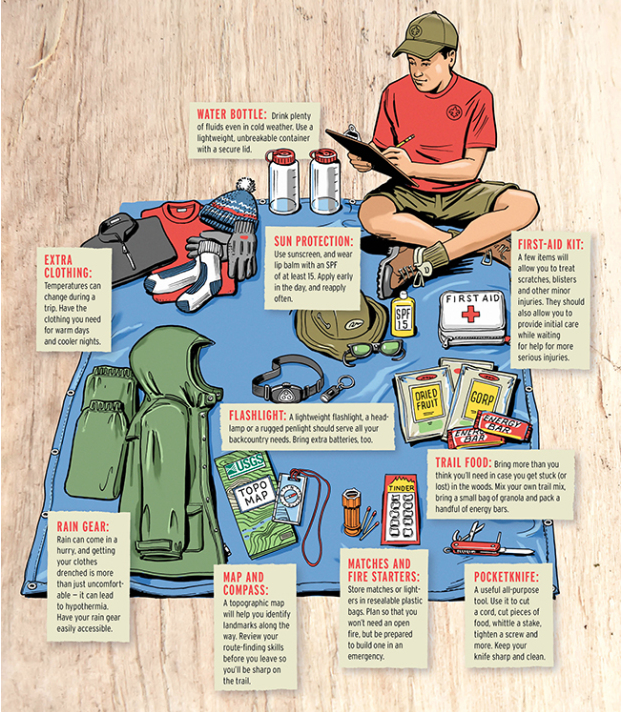Folks,
Here is the packing list for the upcoming Wigwam backpack trip. PLEASE BRING YOUR GEAR WITH YOU TO THE NEXT MEETING. You do not have to bring food, but bring a list of what your meals are going to be.
These are the “essentials” plus a little extra..
1. A pocketknife or multitool can be handy in a wide variety of situations. It’s useful for tasks as large as building an emergency shelter or lighting a campfire with poor fuel, or as small as repairing a damaged backpack. Keep you knife sharp and clean, and don’t forget to first earn your Whittling Chip (for older Cub Scouts) or Totin’ Chip (for Boy Scouts).
2. A first-aid kit can be a lifesaver. Literally. A few items will allow you to treat scratches, blisters and other minor injuries. They should also allow you to provide initial care while waiting for help for more serious injuries. Make sure it’s small for backpacking.
3. Bring extra clothing to match the weather. Multiple layers are better than a single massive jacket, because layered clothing is adaptable to a wide range of temperatures. A good backpacker is a minimalist. Wear one long pair of pants, preferably dry wicking convertible pants. Bring one set of extra underwear. Bring one warm shirt (fleece or hoodie). Wear one t-shirt and have one more. Bring at least 3 pairs of socks…preferably wool or synthetic. Cotton sucks!!! Bring a beanie hat! Do not over pack clothes. Normally, the scout wears the same thing home that he wore to the campout…just needs some extra items for the cold.
4. Rain gear is very important. Rain can come in a hurry, and getting your clothes drenched is more than just uncomfortable, it can lead to hypothermia, a potentially fatal condition. A rain coat can also be your cold weather coat. Please do not have multiple coats. A rain coat over a hoodie or fleece will work fine.
5. A flashlight, headlamp or a rugged penlight is important for finding your way in the dark. Bring extra batteries, too.
6. Trail food is good for maintaining your energy. Bring more than you think you’ll need in case you get stuck (or lost) in the woods. Stay away from junk food. Trail mix, healthy energy bars and dried fruit are best.
7. Water can prevent dehydration, heat exhaustion and heatstroke. Use a lightweight, unbreakable 1 liter Nalgene container with a secure lid. Every scout should have 2 liters. This can be in the form of a Nalgene or Camelback.
8. Matches and/or a fire starter may be used to light fires for heat, or for signaling for help. Store matches or lighters in resealable plastic bags.
9. Sun protection might include sunblock, sunglasses, lip balm and a wide-brimmed hat. No giant sunscreen tubes. A mini-tube of sunscreen or simply a hat and long clothes work fine.
10. A map and compass are probably the most important tools you can carry in case you get lost. Every scout should always carry a compass. The troop will provide the map.
11. Sleeping Bag should be rated to at least 20 degrees. If you can find one that is rated to 0 degrees then even better.
12. The Backpack should have a frame. School backpacks do not provide the support necessary for backpacking trips. I recommend at least a 45L backpack.
13. A Sleeping Pad insulates your scout form the cold ground. This can make all the different in preserving energy, providing a good night sleep and preventing hyperthermia. A foam one works fine…there are more expensive lighter inflatable ones available on many online sites, REI and like outdoor retailers.
The troop will provide backpacking tents, water filter, first aid kit, and Jetboil stoves.
KEEPING CLEAN
Here are some hygiene items you may want to pack, depending on the outing:
- Toothbrush
- Toothpaste
- Dental floss
- Soap
- Waterless hand cleaner
- Washcloth
- Toilet paper
- Trowel for digging cathole latrines
COOKING AND EATING
Here are some cooking and eating items you may want to pack, depending on the outing:
- Bowl for cooking and eating
- Spoon
- Cup or insulated mug
- Water treatment system
- Backpacking stove with fuel (Troop will provide this but you can bring one if you have it).
- Metal Cup that you can heat water on one a stove
EXTRAS
Here are some extras you may want to pack, depending on the outing:
- Watch
- Camera
- Notebook
- Pen or pencil
- Sunglasses
- Small musical instrument
- Gloves
- Whistle
- Nylon cord (50 Ft for close line or improvised fishing)
- Insect repellent
- Hiking stick or trekking poles
- Animal identification books, plant keys, geological studies, star charts or other guide
FOOD
The goal is to keep your scout’s backpack 30-35lbs or lighter…the max weight can vary a little pending on the ability and age of the scout
Please feel free to contact me with any questions!
Sean Warner






